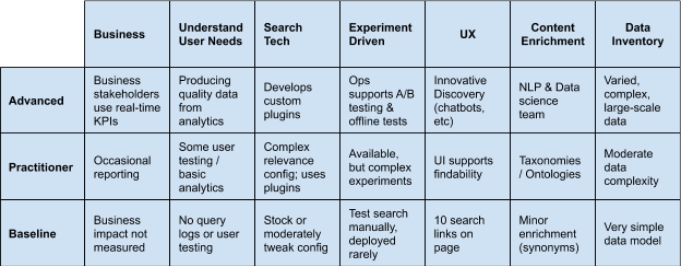MICES is a one-day, free to attend event held in Berlin just after the Berlin Buzzwords conference – it’s a combination of talks and less formal discussion sessions, run by René Krieger and Paul Bartusch and hosted by mytoys.de in their offices. The e-commerce search community is still relatively small but MICES is helping to build it in a friendly and collaborative way, encouraging people to share their experiences and expertise. I’ll give a brief overview of the talks here but videos and slides should be available soon on the conference website.
René welcomed us all to the conference and talked briefly about the importance of subject matter expertise in improving search and made a plea to ‘include the seller perspective’.
OSC is a sponsor of MICES and this year Eric Pugh, co-founder of OSC, gave the first talk after a brief introduction from René. Eric gave an overview of the Search Maturity Model we use at OSC to help our clients measure their ‘search maturity’:

Eric also talked about how we regard search as a ‘team sport’ – and how it’s important to identify the gaps in your team and the best areas for effective future investment.
Next was Jens Kürsten & Andreas Wagenmann of Otto Group on offline evaluation of a search application. They showed how in e-commerce search there must be a balancing act between what the user asks for and the business wants to show them. Initially their system opted for high recall over high precision, which would lead to a lot of irrelevant results (e.g. fashion results for the query “tv”): they used data on product performance drawn from user interactions to improve precision and also mentioned the need to normalise similar queries into a single query.
Andreas Wagner of Searchhub.io talked about optimising findability, and how traditional textual relevance alone is not enough to improve the user’s perceived relevance, with many search results that drive high conversion appearing to be ‘bad’ (irrelevant) results. He mentioned how diversity of results is important to expose products to the user that may drive improved revenue, and how he had developed a composite model that combined measures of ‘sellability’ with findability.
Peter Thomas of Attraqt talked about how search teams need to respond to a rapidly evolving search landscape: his recommendations included unlocking silos, sharing data, allowing teams to set their own goals and to be allowed to learn from making mistakes. He also recommending training (something OSC can help with) and overall a collaborative learning approach.
Diego José de Calazans & Georg Wolf of MediaMarktSaturn talked about search quality as a business goal, and repeated some themes from previous talks about how to find that sweet spot between business requirements and relevance. They used metrics such as NCDG but acknowledged the high manual effort required to gather human judgement data. Customer interactions gave a way to perform automatic search optimisation, but they also mentioned how factors such as advertising campaigns can affect this data.
Cagdas Senol of Zalando was the first speaker after lunch, and talked about how they have developed a way to sort their source data before indexing. He also mentioned his open source testing framework for Painless scripts, used by Elasticsearch. Roman Grebennikov of Findify was next with an amusing and interesting talk on building a personalised search framework using machine learning. He mentioned how on an e-commerce site you may have a very small time window to learn about the customer and the risk of position bias causing positive feedback loops.
Our last speaker was Angel Maldonado of Empathy.co who gave a wonderful and inspiring talk on how good search experiences aren’t just about algorithms but should also inspire joy and create trust. The latter point was well illustrated by what called the ‘Netflix pattern’ – if you are using an algorithm personalised to the user, tell them and allow it to be turned off, rather than just imposing it.
After the formal talks, we then split into groups for various roundtable discussion sessions on a variety of topics including best practices for gathering judgment data. MICES then came to and end with a drinks reception and a few of us then went out for pizza in the evening sun.
Eric and I would like to thank René, Paul, all at Mytoys and everyone else who made the event possible. It was great to meet so many of the European e-commerce search community and hear about some of the fascinating work being done in this area of search. We’ll be back!
